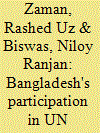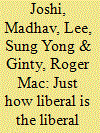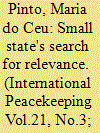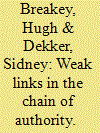|
|
|
Sort Order |
|
|
|
Items / Page
|
|
|
|
|
|
|
| Srl | Item |
| 1 |
ID:
133937


|
|
|
|
|
| Publication |
2014.
|
| Summary/Abstract |
This article argues that the participation of the Bangladeshi armed forces in UN peacekeeping has produced positive benefits for civil-military relations in the country and that this process is best explained by reference to concordance theory, as propagated by Rebecca Schiff. Unlike traditional theories of civil-military relations, concordance theory highlights dialogue, accommodation and shared values or objectives held by the military, the political elites and society. We argue in this paper that peacekeeping has gradually emerged in Bangladesh as an issue where all three partners are converging and prone to hold similar views. This may have a profound impact upon Bangladeshi politics whereby the chances of military intervention in domestic politics will lessen. This paper helps in understanding the implications of Bangladesh's involvement in UN peace missions, an issue on which little work has been conducted until now despite the fact that it has important implications for both the Bangladesh state and its armed forces.
|
|
|
|
|
|
|
|
|
|
|
|
|
|
|
|
| 2 |
ID:
133940


|
|
|
|
|
| Publication |
2014.
|
| Summary/Abstract |
This article assesses the extent to which the liberal peace (the dominant form of internationally supported peacemaking) actually deserves the sobriquet 'liberal peace'. In recent years, an intense debate emerged on this question as critics of the critique of the liberal peace have sought to downplay the dominance of the liberal peace. These debates are interesting but they are mainly based on qualitative analysis supplemented with some case study material, and often rely on assertions rather than evidence. This article seeks to add to this debate with simple aggregate data from the Peace Accords Matrix that is comprehensive and comparative. The article constructs a five-part framework to analyse the liberal elements of peace accords liberalism and then tracks the extent to which the elements of the framework are found in peace accords. Through this examination, it is found that the liberal peace is indeed the dominant form of peace-support intervention, although there are considerable variations in the extent and implementation of the liberalism in peacebuilding.
|
|
|
|
|
|
|
|
|
|
|
|
|
|
|
|
| 3 |
ID:
133939


|
|
|
|
|
| Publication |
2014.
|
| Summary/Abstract |
In March 2008 the United Nations General assembly adopted Resolution 62/214, which promulgated the 'Comprehensive Strategy on Assistance and Support to Victims of Sexual Exploitation and Abuse by United Nations Staff and Related Personnel'. Although reports on widespread sexual exploitation and sexual abuse emerged in the early 1990s, until 2008 there was no strategy specifically developed to assist women sexually exploited or abused by, and children fathered by, UN peacekeepers. In this sense, the Comprehensive Strategy is groundbreaking. However, we argue that UN policy fails to distinguish adequately between sexually exploitative and consensual relationships, which can create confusion for personnel as to what sexual conduct is permitted and what is prohibited. This paper will provide a critical analysis of the Comprehensive Strategy, examining its potential and obstacles to its implementation, with specific regard to children born to peacekeeping personnel engaged in consensual relationships with local women. This examination will be conducted within the context of the case study of Marko Šušnja, born to a Bosnian peacekeeper father and East Timorese mother.
|
|
|
|
|
|
|
|
|
|
|
|
|
|
|
|
| 4 |
ID:
133941


|
|
|
|
|
| Publication |
2014.
|
| Summary/Abstract |
During the cold war period, Portugal was largely absent from participation in United Nations Peacekeeping operations (UNPKO). However, since the end of the cold war, Portugal has reviewed its peacekeeping policy and has made a strong commitment to UN operations. The aim of this article is to determine Portugal's motives for participating in PKO, a costly and hazardous venture, especially for a small country with limited resources. I argue that Portugal's involvement in peacekeeping stems from the belief of policy-makers that such activities promote the country's national interests by enhancing its influence in key international fora such as the UN. However, the article also argues that the concept of national interest is best understood through the lens of constructivism, because constructivist scholarship has largely been interested in how international norms, rules and principles shape and constitute state understandings of practices and order. Peacekeeping has thus been pursued by Portugal as a vehicle for the pursuit of a socially constructed conception of the national interest, rooted in a commitment to particular hegemonic values and conceptions of international peace and security embodied in, and by, organizations such as the UN.
|
|
|
|
|
|
|
|
|
|
|
|
|
|
|
|
| 5 |
ID:
133935


|
|
|
|
|
| Publication |
2014.
|
| Summary/Abstract |
This paper shows how UN Security Council resolutions can facilitate the international socialization of an Islamist political actor. The study undertakes a process-tracing analysis of the negotiations and attempts to implement UNSC Resolutions 1559 and 1701 and then assesses their impact on Hezbollah's agency and political identity. The author argues that UNSC resolutions can inform processes of social influence that directly affect the activity of non-state actors and then cause international socialization. According to the analysis proposed international socialization has produced three main effects on Hezbollah that are: increased accountability; a shift in its legitimacy paradigm; and a mutation of Hezbollah's relation with the Lebanese state.
|
|
|
|
|
|
|
|
|
|
|
|
|
|
|
|
| 6 |
ID:
133936


|
|
|
|
|
| Publication |
2014.
|
| Summary/Abstract |
The United Nations Security Council mandates peacekeeping operations to protect civilians, and regularly authorizes operations to use force to achieve this objective. Yet in the challenging situations facing contemporary peacekeeping operations, local civilians remain vulnerable to extreme violence. One set of reasons for this unwelcome result surrounds the decisions to protect civilians forcefully in any given context. This paper describes how peacekeeping operations vest discretion over the use of robust force across multiple agents. Using signal detection theory to model the decision-making of these agents, our analysis shows how the iterative nature of the decision-making process gives rise to a chain of authority where the most conservative decision-maker tends to prove decisive. With this analysis in tow, we turn our attention to recent protection initiatives, including Security Council Resolution 2098 (2013) and its controversial mandate for the new 'Intervention Brigade' in the Democratic Republic of the Congo.
|
|
|
|
|
|
|
|
|
|
|
|
|
|
|
|
|
|
|
|
|